- Home
- Leo Tolstoy
Lives and Deaths Page 6
Lives and Deaths Read online
Page 6
Gerasim came closer to Ivan Ilyich and, just as lightly as he stepped, embraced him with his strong hands and lifted him with a deft, gentle movement; he held him upright with one hand, pulled up his trousers with the other, and was about to sit him down, but Ivan Ilyich asked to be led to the sofa. Effortlessly, without applying, it seemed, any pressure at all, Gerasim led him—almost carried him—to the sofa and sat him down.
“Thank you. You… you do everything so deftly, so well.”
Gerasim smiled again and was about to leave. But Ivan Ilyich felt so good in the lad’s presence that he did not wish to let him go.
“Listen, would you bring that chair closer, please? No, that other one there. Put it under my feet. I feel better when my feet are up.”
Gerasim brought the chair, set it down firmly without making a noise and lifted Ivan Ilyich’s legs onto the seat. It seemed to Ivan Ilyich that he felt better while Gerasim was holding his legs.
“It’s better when my feet are higher,” he said. “Lay that cushion under them.”
Gerasim did as he was asked. He lifted Ivan Ilyich’s legs and set them down. Once again, Ivan Ilyich felt better as long as Gerasim was holding his legs; when Gerasim lowered them, he seemed to feel worse.
“Gerasim,” he said. “Are you busy now?”
“Not at all, sir,” replied Gerasim, who had learnt from the townspeople how to speak to gentlefolk.
“What else have you got to do today?”
“Not a thing, really—did it all, aside from chopping the firewood.”
“Well, then, could you hold my legs higher?”
“Sure can.” Gerasim raised his master’s legs—and it seemed to Ivan Ilyich that, in this position, he felt no pain at all.
“What about the firewood?”
“Don’t you worry about that. Plenty of time.”
Ivan Ilyich told Gerasim to sit down and hold his legs. He and the lad had a talk. And, strangely enough, it seemed to him he felt better while Gerasim was holding his legs.
After that Ivan Ilyich would sometimes call Gerasim and make him hold his legs on his shoulders, happily chatting with the lad. Gerasim did this easily, willingly, simply and with a kindness that touched his master. Ivan Ilyich was offended by the health, strength and vitality of all others, but the strength and vitality of Gerasim did not upset him—it soothed him.
Ivan Ilyich’s greatest torment was the lie—a lie that was, for some reason, accepted by everyone—according to which he was merely ill, not dying, and only had to remain calm, take his treatment and then something very good would result. He knew, of course, that no matter what was done, the only result would be still greater suffering and death. This lie tormented him; he was tormented by the fact that no one was willing to admit what everyone knew and what he himself knew, that they instead wished to lie about his dreadful situation, and that they wished and forced him to take part in this lie. This lie, a lie spun around him on the eve of his death—a lie that forcibly brought the terrible, solemn act of his death down to the level of all their visits, their curtains, their sturgeon for dinner—was enormously painful for Ivan Ilyich. And strangely enough, on many occasions, when they were performing their little acts around him, he was a hair’s breadth away from shouting: Stop it! I’m dying—you know it and I know it—so at least stop lying about it! But he could never work up the courage to do it. He saw that everyone around him had relegated the terrible, frightful act of his dying to the level of a casual unpleasantness, a slight indecency (as when someone enters a drawing room and makes a bad smell), and they had done so by virtue of the very “decency” he had served his entire life. He saw that no one would pity him, because no one even wished to understand his situation. Gerasim alone understood it and pitied him. And so Ivan Ilyich felt good only with Gerasim. He felt good when Gerasim held his legs, at times all night long, refusing to go to bed—“Don’t you worry, Ivan Ilyich, I’ll get my sleep yet”—or when he would suddenly adopt a familiar tone and say, “It’d be one thing if you wasn’t sick, but things being what they are, why shouldn’t I do a little work?” Gerasim alone did not lie; it was obvious that he alone understood what was happening, felt no need to conceal it and simply pitied his weak, emaciated master. One time, when Ivan Ilyich was sending him away, Gerasim even said straight out: “We’ll all be dying someday. So why shouldn’t I do a little work?” What he meant by this was that he did not feel burdened by the work he was doing, because he was doing it for a dying man and he hoped someone would do the same for him when his time came.
In addition to this lie, or as a consequence of it, what tormented Ivan Ilyich most was the fact that no one pitied him the way he wished to be pitied. There were times when Ivan Ilyich, after much suffering, wished above all else—however much it shamed him to admit it—to be pitied as sick children are pitied. He wanted someone to kiss, caress and weep over him, as they would caress and console a child. He knew that he was an important member of the court, that his beard had begun to turn grey and that what he desired was therefore impossible—but he still desired it. He found something like it in his relationship with Gerasim, and so this relationship was of great comfort to him. Ivan Ilyich wanted to cry, wanted someone to caress him, to weep over him—but in comes his colleague, Member of the Court Shebek, and instead of crying or exchanging caresses, Ivan Ilyich puts on a serious, stern, thoughtful aspect and, by force of habit, expresses and stubbornly defends his opinion on a decision handed down by the Court of Cassation. The presence of this lie, all around him and within him, did more than anything to poison the final days of Ivan Ilyich’s life.
VIII
It was morning. It must have been morning because Gerasim had left and Pyotr the footman had come in and put out the candles, drawn back one of the curtains and begun to tidy up. Whether it was morning or evening, Friday or Sunday, no longer mattered. It was all the same now, always the same: the gnawing, tormenting pain that would not for a moment subside; the awareness of life slipping hopelessly away but not yet gone; the approach of terrible, loathsome death—the only reality; and always the same lie. Days, weeks, hours, what did they matter now?
“Would master like some tea?”
He needs routine—needs the gentlefolk to drink tea in the morning, thought Ivan Ilyich, but said only:
“No.”
“Wouldn’t master like to move to the sofa?”
He needs to tidy up the room, and I’m in the way—to him I’m filth, disorder, he thought, but said only:
“No, let me be.”
The footman kept bustling about. Ivan Ilyich reached out his hand. Pyotr approached, ready to help.
“What would the master like?”
“My watch.”
Pyotr picked up the watch, which was close at hand, and gave it to Ivan Ilyich.
“Half past eight. Are they up?”
“No, no they aren’t, sir. Vasily Ivanovich”—Ivan Ilyich’s son—“has gone off to school, and Praskovya Fyodorovna ordered me to wake her if master asked for her. Would master like me to wake her?”
“No, don’t.” Shouldn’t I try some tea? he thought. “Yes, tea… Bring me some tea.”
Pyotr went to the door. Ivan Ilyich had come to dread being alone. How can I keep him here? Yes, the medicine. “Pyotr, give me my medicine.” Why not? It might still help. He took the spoonful and drank it. No, it won’t help. It’s all nonsense, deception, he decided as soon as he experienced that familiar, sickly-sweet, hopeless taste. No, I can’t force myself to believe it any longer. But the pain, the pain… For a single minute without pain… And he began to moan. Pyotr returned. “No, go—go bring me some tea.”
Pyotr went out. Now by himself, Ivan Ilyich moaned not so much from pain—although the pain was terrible—as from anguish. All the same, always the same, the endless nights and days. Oh, I wish it would hurry. What would hurry? Death… Darkness… No, no—anything is better than death.
When Pyotr came in with the tea on a tray
, Ivan Ilyich gazed at him blankly for a long time, not understanding who or what he was. This gaze confused and embarrassed Pyotr, and when Pyotr grew embarrassed, Ivan Ilyich came to his senses.
“Yes, tea,” he said. “Very good… Set it down. Just help me wash and put on a clean shirt.”
Ivan Ilyich began to wash. With pauses for rest, he washed his hands and his face, brushed his teeth, then began to comb his hair and looked in the mirror. He was frightened by what he saw; what frightened him most was the way his hair lay flat on his pale forehead.
As his shirt was being changed he knew that a glance at his body would prove still more frightening, so he avoided looking at himself. But then it was over. He put on his robe, covered himself with a rug and sat down in the armchair to drink his tea. For a moment he felt refreshed, but as soon as he took a sip, there they were—that same taste, that same pain. He forced himself to finish, then lay down again, stretching out his legs. He lay down and dismissed Pyotr.
The same thing, always: a glimmering drop of hope, drowned out by a raging sea of despair and always, constantly, the pain—the constant pain, the constant anguish, always the same. It was terribly depressing to be alone; he always wanted to call someone, but he knew that the presence of others was still more depressing. Another dose of morphine—better oblivion… The doctor has to come up with something else. This is impossible, impossible.
An hour passes, two hours—but then the doorbell rings. The doctor? Yes. And here he is, fresh, vigorous, plump, cheerful, with an expression that seems to say, Well, you’ve given yourself quite a fright, but we’ll sort it all out. The doctor knows that this expression is out of place here, but having put it on for good and all, he can no longer remove it, like a man who has put on a tailcoat in the morning and gone out to pay calls.
The doctor rubs his hands vigorously, reassuringly.
“It’s a cold one out there. I tell you, that frost means business. Let me warm up a bit,” he says, as if to suggest that it is only a matter of waiting until he is warm, at which point he will set everything right.
“Well, how…?”
Ivan Ilyich senses that the doctor wants to say, How’s it going? but that he too feels this would be inappropriate, so he says instead: “How was your night?”
Ivan Ilyich gives the doctor a look that asks: Will you really never feel ashamed for lying to my face? But the doctor does not want to acknowledge this question.
And so Ivan Ilyich says:
“Awful, as always. The pain won’t stop, won’t relent. Please think of something, anything.”
“Yes, that’s what you sick people always say. Well, now I seem to be warm enough. Even the scrupulous Praskovya Fyodorovna would voice no objection to my temperature. Good morning, sir,” and the doctor presses Ivan Ilyich’s hand.
Then, abandoning his former playfulness, the doctor begins to examine his patient with a serious air, feeling his pulse and his temperature, tapping and auscultating.
Ivan Ilyich knows beyond a doubt that all this is nonsense and hollow deception. But when the doctor kneels beside him, placing his ear first higher, then lower, and, with a most significant countenance, makes various gymnastic movements over his body, Ivan Ilyich gives in to it, just as he had sometimes given in to the speeches of lawyers when he knew full well that they were lying and why they were lying.
The doctor, kneeling on the sofa, is still tapping away when Praskovya Fyodorovna’s silk dress rustles at the door and she is heard reproaching Pyotr for not informing her of the doctor’s arrival.
She enters, kisses her husband, and immediately begins to assert that she has been up for ages and only failed to be there when the doctor arrived because of a misunderstanding.
Ivan Ilyich looks at her, examines her from top to toe, resenting and blaming her for the whiteness, plumpness and cleanliness of her hands and neck, the gloss of her hair and the glitter of her eyes, which are brimming with life. He hates her with all his heart. And he suffers from a rising tide of hatred at her touch.
Her attitude towards him and his illness is unchanging. Just as the doctor had worked out an attitude towards his patients that he could no longer shake off, so had she developed an unshakable attitude towards her husband—that he was not doing something he ought to be doing, that it was all his own fault, and that she was lovingly admonishing him for it.
“He simply won’t listen to me! Never takes his medicine on time. And worst of all, he lies in a position that is probably quite harmful to him—with his legs up.”
She describes how he makes Gerasim hold his legs.
The doctor smiles with affable condescension, as if to say: What can you do? These sick people come up with all sorts of bosh, but that can be forgiven.
When the examination was over, the doctor glanced at his watch, and then Praskovya Fyodorovna announced to Ivan Ilyich that he, of course, could do as he pleased, but she had invited a celebrated specialist to come to the house that day, and this specialist and Mikhail Danilovich (the name of the ordinary doctor) would look him over together and discuss his case.
“Please don’t resist. I’m doing this for my sake,” she said ironically, letting it be felt that she was doing it all for his sake and had only said otherwise so as to deprive him of the right to refuse. He knit his brows and remained silent. The lie surrounding him, he sensed, had got so tangled that it was hard to make out anything at all.
Everything she put him through was done strictly for her own sake, and she told him she did it for her own sake as if the assertion were so incredible that its opposite must be true.
And indeed, at half past eleven, the celebrated specialist arrived. Again there were auscultations and significant conversations in his presence and in the other room concerning the kidney and the blind gut, and enquiries and responses issued with such an air of importance that, once again, in place of the real question of life and death, which was now the only question before him, there emerged the question of the kidney and the blind gut, which were behaving improperly and upon which Mikhail Danilovich and the celebrity were ready to pounce at any moment, so as to force them to mend their ways.
The celebrated specialist bade farewell with a serious but not altogether hopeless expression on his face. And to the timid question that Ivan Ilyich, his eyes glistening with fear and hope, raised as to whether there was a possibility of recovery, he replied that, though he could not vouch for it, such a possibility existed. The hopeful gaze with which Ivan Ilyich watched the doctor leave was so pitiful that, upon seeing it, Praskovya Fyodorovna even broke into tears as she went out to hand the celebrated specialist his fee.
The heartening effect of the specialist’s reassurance did not last long. Again the same room, the same pictures, curtains, wallpaper, vials and the same aching, suffering body. Ivan Ilyich began to moan; he was given an injection and drifted into oblivion.
When he came to, it was twilight. He was served dinner and forced down some broth—and then again it was the same as always and another night approached.
After dinner, at seven o’clock, Praskovya Fyodorovna came into his room in evening dress, with her large breasts corseted and with traces of powder on her face. She had reminded him in the morning of their trip to the theatre. Sarah Bernhardt was in town and they had a box that he had insisted they take. Now he had forgotten about it and her attire offended him. But he concealed his resentment when he remembered that he himself had insisted on their engaging a box and going, because it would be an educative aesthetic pleasure for the children.
Praskovya Fyodorovna came in looking self-satisfied yet somehow guilty. She sat down and asked about his health—but he saw that she asked this simply for the sake of asking, not in order to find out, for she knew there was nothing to find out—and then she proceeded to tell him what she needed to say: that she would not have gone for anything in the world, but they had already engaged the box, and Helen and their daughter and Petrishchev (the examining magistrate, their daughter
’s fiancé) were going, and she could not, of course, let them go alone… Although she would have much preferred to sit here with him. And he should be careful to follow the doctor’s instructions while she was away.
“Oh, and Fyodor Petrovich”—the fiancé—“would like to come in. May he? And Liza too.”
“Very well.”
The daughter came in dressed in the finest fashion, baring her youthful flesh—the same flesh that made him suffer so. And here she was, exhibiting it. She was strong, healthy, obviously in love and indignant at the illness, suffering and death that stood in the way of her happiness.
Fyodor Petrovich came in too, wearing a tailcoat, with his hair curled à la Capoul,9 a white collar tight about his long, sinewy neck, an enormous white shirtfront, narrow black trousers clinging to his strong thighs, and one hand in a white glove, holding his opera hat.
The schoolboy crept in behind him, poor little fellow, wearing a new uniform and gloves. He had awful blue shadows under his eyes; Ivan Ilyich knew what that meant.
His son had always seemed pitiful to him. Now the boy’s frightened, commiserating gaze terrified him. It seemed to Ivan Ilyich that, besides Gerasim, Vasya alone understood and pitied him.
They all sat down and asked about his health again. This led to silence. Liza asked her mother about the opera glasses. This led to a quarrel between mother and daughter as to where the glasses were and who had put them there. It was all rather unpleasant.
Fyodor Petrovich asked Ivan Ilyich whether he had ever seen Sarah Bernhardt. At first Ivan Ilyich did not quite understand the question, but then he replied: “No. Have you?”
“I have. In Adrienne Lecouvreur.”
Praskovya Fyodorovna opined that Bernhardt was especially good in such and such a role. The daughter disagreed. This gave rise to a conversation about the elegance and realism of her acting—a conversation that is always exactly the same.
In the midst of this conversation Fyodor Petrovich glanced at Ivan Ilyich and fell silent. Then the others glanced at Ivan Ilyich and also fell silent. Ivan Ilyich was staring straight ahead, with glistening eyes, clearly indignant with them. This had to be set right, but there was no way to set it right. Somehow, the silence had to be broken, but no one dared break it—and they were all growing afraid that the decent, decorous lie might somehow, suddenly, be punctured, that they would all be forced to confront reality. Liza was first to act. She broke the silence. Although she wished to conceal what everyone was feeling, she made it known.

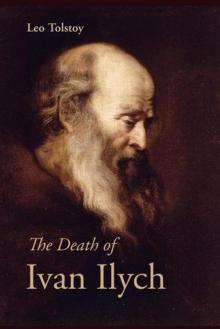 The Death of Ivan Ilych
The Death of Ivan Ilych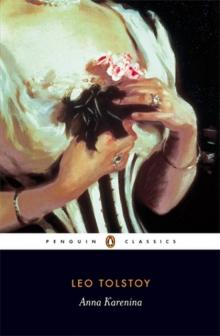 Anna Karenina
Anna Karenina Resurrection
Resurrection Family Happiness
Family Happiness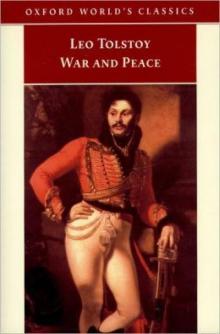 War and Peace
War and Peace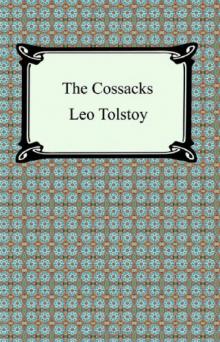 The Cossacks
The Cossacks The Kreutzer Sonata
The Kreutzer Sonata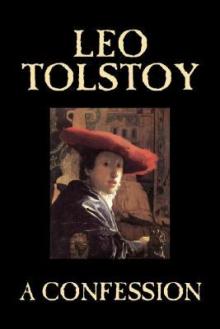 A Confession
A Confession The Kingdom of God Is Within You
The Kingdom of God Is Within You Father Sergius
Father Sergius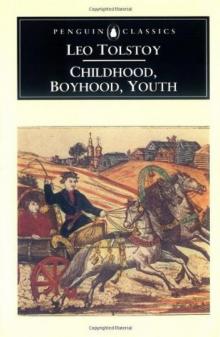 Childhood, Boyhood, Youth
Childhood, Boyhood, Youth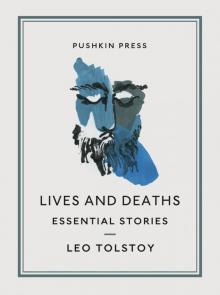 Lives and Deaths
Lives and Deaths The Devil
The Devil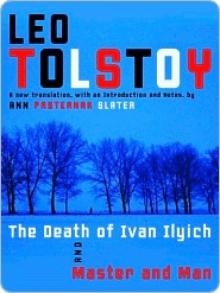 The Death of Ivan Ilyich and Master and Man
The Death of Ivan Ilyich and Master and Man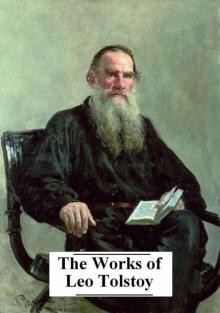 The Complete Works of Leo Tolstoy (25+ Works with active table of contents)
The Complete Works of Leo Tolstoy (25+ Works with active table of contents)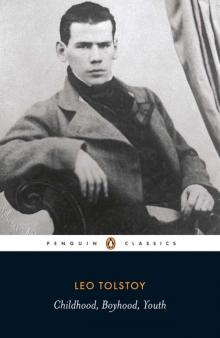 Childhood, Boyhood, Youth (Penguin ed.)
Childhood, Boyhood, Youth (Penguin ed.)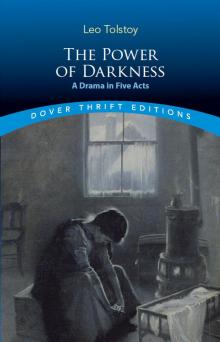 The Power of Darkness
The Power of Darkness Android Karenina
Android Karenina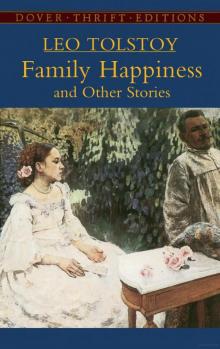 Family Happiness and Other Stories
Family Happiness and Other Stories The Lion and the Puppy
The Lion and the Puppy Collected Shorter Fiction, Volume 2
Collected Shorter Fiction, Volume 2 Collected Shorter Fiction, Volume 1
Collected Shorter Fiction, Volume 1